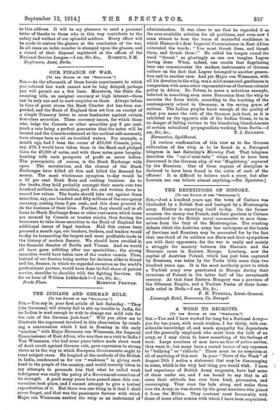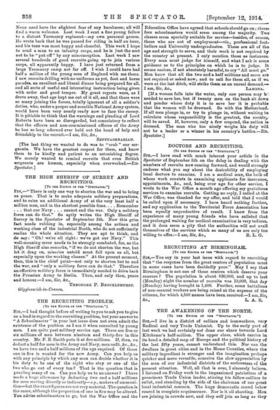A WORD TO RECRUITS.
[To THE EDITOR OP THZ "SPECTATOR.")
Stu,—You and I have worked for long for a National Army— you for ten years, with much wisdom, I for thirty, with con- siderable knowledge of, and much sympathy for, dependants and the generally employed, who must form the bulk of an army, so I may claim to know something of the feelings of such. Large numbers of men have no fear of active service, they want it ; but many have a rooted horror of any exposure to " bullying " or "ridicule." There must be no suspicion at all of anything of this sort. In your "News of the Week" of August 29th I notice a statement that may be discouraging to some, which is the very last thing you would wish. I have had experience of British Army sergeants, have had some of them under me, and I am bound to say that in all cases their attitude has ever been kind, persuasive, and encouraging. They coax the lads along and make them love the Army, as was shown by the great numbers who joined it from the Militia. They contrast most favourably with those of some other armies with which I have been acquainted.
None need have the slightest fear of any harshness; all will find a warm welcome. Last week I sent a fine young fellow to a distant Yeomanry regiment—my own personal groom. He wrote back that he was passed for riding in half an hour, and his tone was most happy and cheerful. This week I hope to send a man to an infantry corps, and he is just the sort not to be " put off" by any misconception. Last week I saw several hundreds of good recruits going up to join various corps, all apparently happy. I have just returned from a large Yeomanry camp not far off. I wish I could have had half a million of the young men of England with me there. I saw recruits drilling with no uniforms as yet, foot and horse parades, an excellent and liberal dinner being prepared for all, and all sorts of useful and interesting instruction being given with order and good temper. My great regrets were, as I drove away, that age kept me out of it all, and that there were so many joining the forces, totally ignorant of all a soldier's duties, who, under a proper and sensible National Army system, would have been very nearly ready now to face the enemy. It is pitiable to think that the warnings and pleading of Lord Roberts have been so disregarded, but consolatory to reflect that the officers and non-commissioned officers of the Army he has so long adorned ever hold out the hand of help and friendship to the recruit.—I am, Sir, &c.,
SEPTUAGENARIAN.
The last thing we wanted to do was to " crab " our ser- geants. We have the greatest respect for them, and know them to be kindly and patient to an astonishing degree. We merely wanted to remind recruits that even British sergeants are human, especially when overworked.—ED. Spectator.]



































 Previous page
Previous page